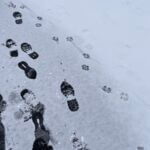When you fall from a great height, and know you are falling, your immediate instinct will be to save yourself. You will recall the precise moment at the height of the fall.
When you fall from a great height, and do not know you are falling, you will recall the precise moment of impact.
Regardless, your body will feel your trauma.
After my last fall, out of a top bunk at Georgia’s Hike Inn, my sister informed me that she no longer trusted me in terms of my post-accident-evaluations: “You go into shock,” she insisted, “and deny anything is wrong with you!” After this specific fall (6 feet onto the hardwood floor of our bunkroom), I immediately stood up, climbed the ladder to my bunk and went back to sleep.
A year ago, I flew over the handlebars of my bicycle after crashing into a bollard and fractured my collar bone. I insisted I was ok and rode my bicycle back to the car.
My most horrific accident occurred when my Lex was a puppy. It was past ten pm on a Thursday in October. Lexi was playing chase. I decided to run back home so she would follow me. I ran toward the light at the right side of my garage door, forgetting the drop to my neighbors’ walk-out basement. I remember only the impact. I knew it was bad. My left arm was dead—the humorous was completely severed below the shoulder joint. My left elbow was crushed, my left pelvis fractured. My right groin was pulled. Severely. My dog was looking at me as if wondering why I had done something so stupid. (She had reached the driveway properly). I cried out for help. Of course no one heard me. So I got myself up, replaced my prescription glasses on my face, hobbled home, and spent the night in my sunroom recliner. I would need two people to get me out of bed to go to the bathroom for more than a full week and an additional week in a rehab hospital learning how to shower, dress, and get out of bed on my own. Occupational therapy enables one to function.
I dare not think of trauma not originally physical.






















